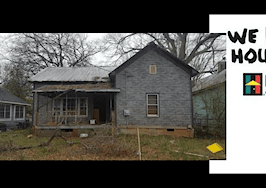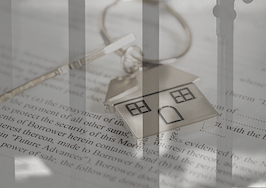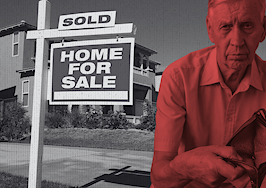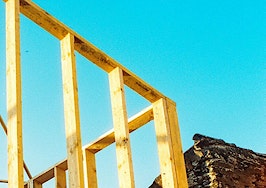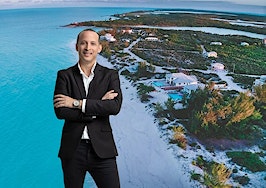Mortgage rates are expected to rise this year, aggravating the already-vexing problem of not enough existing homes on the market, according to a panel of economists speaking last week at the International Builders Show in Orlando.
Among the experts there was no consensus on rates other than that they are poised to increase. But Frank Nothaft, the former chief economist at mortgage giant Freddie Mac who now wears the same hat at CoreLogic, pointed out that those homeowners with mortgages at lower than the prevailing rate are thinking twice about putting their homes up for sale. “Realtors call it the lock-in effect,” he said.
Rather than sell, Nothaft explained, current owners may opt to stay a little longer and perhaps choose to update their residences, even if mortgage rates are only slightly higher than the one they’re paying now.
“The very limited inventory of homes on the market will continue,” he later told an overflow crowd of builders and allied professionals during a conference session, pointing out that the current number of existing homes for sale is at its lowest level in 35 years.
Why aren’t homeowners selling?
Nothaft thinks loan costs, which “have been really cheap for the last several years,” will rise to about 4.5 percent “over the course” of 2018. But combine that with an expected 6 percent jump in prices because so few houses are for sale, he added, and the result is a 13 percent increase in the typical mortgage payment. “That’s the crux of affordability,” he said.
Meanwhile, research from Trulia found that it’s getting even more difficult for potential buyers to find a house. Year-over-year, the inventory of houses on the market sank 10.5 percent in last year’s fourth quarter, Trulia found. “That’s the biggest drop we’ve seen since the second quarter of 2013,” it reported.
Trulia also found that the fourth quarter’s listings were the most unaffordable on record. Buyers in the starter homes market will have to pay an average of 40 percent of their monthly income to be able to afford their monthly house payment, while those in the trade-up sector will have to pay 26 percent more on average and those in the premium, upper echelon market will have to pay an average of 14 percent more.
But research released at the big conference and expo conflicted with Nothaft’s (and other professional’s) lock-in theory, indicating instead that it’s neither rising loan costs nor higher prices that’s holding back the resale market. Rather, it’s that most homeowners who could move up simply don’t want to.
According to the study by the National Association of Home Builders (NAHB), which sponsors the big conference and new building products expo, only 5 percent of current owners want to hold on to their low-rate mortgages and just 4 percent believe it’s too expensive to move. On the other hand, said Rose Quint, senior vice president of research at the NAHB, 70 percent of those surveyed “like their house and are comfortable in it.” And 21 percent said they “don’t want to take on the hassle of finding and moving” to a new place.
Expect gains in single-family housing starts this year
Whatever the factors that are battering the resale market, the new-home sector is set for its best year since the Great Recession a decade ago. Even as builders are facing their own headwinds, the NAHB says single-family housing starts will jump 5 percent this year to 893,000 and another 5 percent next year to 940,000.
In November alone, new-home sales increased 17.5 percent from the previous month, “reaching the fastest sales pace in more than 10 years,” NAHB’s chief economist, Robert Dietz, pointed out.
Even at that pace, though, that’s still only 73 percent of the 1.343 million houses builders should be producing just to keep up with current household growth.
“Confidence among builders at the end of 2017 reached its highest measure in more than 18 years,” said Dietz. And much of that optimism is due, he added, to the “tight existing home inventory.”
Builders could be putting up even more houses this year and next if they weren’t plagued by a tight labor market, a lack of buildable home sites and rising costs for key building materials.
Labor shortage capping new-home market potential
The lack of workers to build houses has been a consistent thorn for builders, and it has been exacerbated by the Trump Administration’s stand on immigration. The shortage of skilled, trained and proven craftsmen is invariably cited by builders as the top problem in survey after survey.
The NAHB’s Dietz says not only is the construction workforce smaller than it was prior to the recession — a time when many workers left construction altogether to find jobs in other fields — but there are more open, infilled jobs as a share of the workforce than at any other time. “Worse,” he said, the situation “doesn’t look like it’s going to change much over the next few years.”
In talking to some 300 homebuilding executives over the last year, John Burns Real Estate Consulting found that labor costs are escalating as builders pay up to find and keep polished labor. “Stronger than expected sales have pushed the trades to the limit,” said Burns’ analysts Jody Kahn and Devyn Bachman.
Land prices continue to rise, too, as builders are paying dearly for fewer and fewer home sites on which construction can start right away. But the builders the Burns firm talked to said they were all but blindsided by the size of the increase in the cost of building products.
Although they said they anticipated some increases, the extent of the bumps were shocking, especially when it came to lumber, drywall and concrete. The cost of softwood lumber, for example, is up 15 percent from January 2017, according to the NAHB. Gypsum prices have increased almost 8 percent, and oriented strand board, a replacement for plywood, is up 30 percent.
Dietz said the 20 percent tariff imposed on Canadian softwood lumber by the Trump Administration is exactly the opposite of what builders and buyers need. He estimates that the duties are responsible for nearly a 7 percent increase in house prices and have already driven prices up by an average of $1,360.
All of this suggests that despite the larger number of homes for sale, they will be more expensive in the years to come. David Berson, chief economist of insurer Nationwide expects prices to be up by 6 percent by year’s end, and Nothaft at CoreLogic is looking for 5-6 percent price growth this year.
NAHB, however, has scaled back its projections for prices, suggesting they will rise only 2.9 percent this year before moving up at a greater pace in the ensuing years.
How active will the Fed be?
Finally, about the pesky interest rates: Berson pointed out that the Federal Reserve Board has already signaled further tightening of the federal funds rate perhaps three or four times this year. The Fed funds rate is the rate banks charge one another, and long-term mortgage rates usually follow suit.
Nothaft expects a half to three-quarter point rise in rates to perhaps 4.5 percent by year’s end. And the NAHB has the 30-year fixed-rate mortgage at 4.8 percent by the end of 2019.
To put those predictions into perspective, 4 to 5 percent is the same rate in effect in 2013, and it’s less than the 5.1 percent rate recorded in April 2011 and the 6.5 percent rate recorded for the entirety of 2008.
Lew Sichelman’s weekly column, “The Housing Scene,” is syndicated to newspapers throughout the country.


